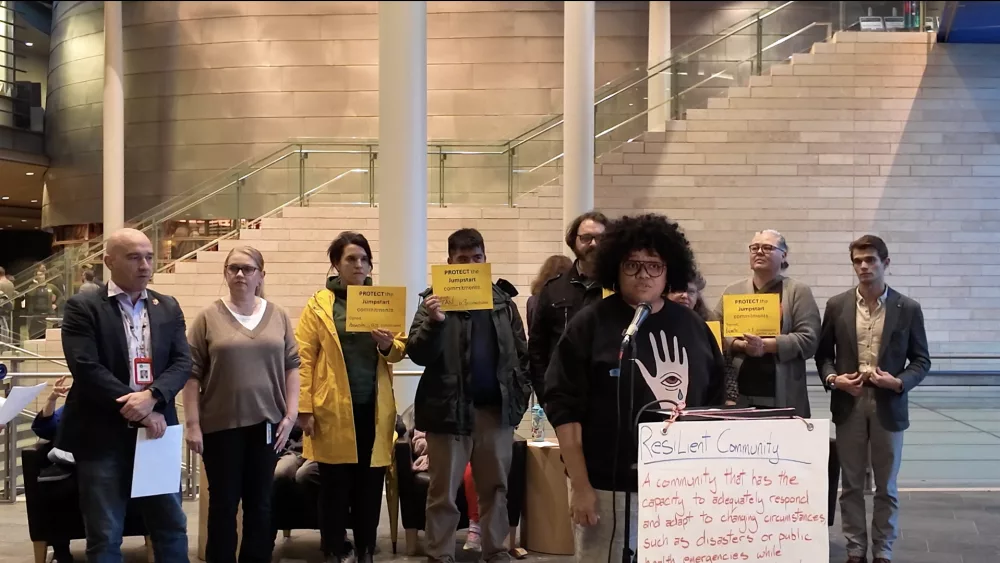(The Center Square) – The King County Regional Homelessness Authority’s recent setbacks have coincided with Seattle announcing it will soon pull back some annual funding from the authority, but some cities are still locked in on fund efforts to combat homelessness through the organization.
Seattle informed the King County Regional Homelessness Authority that it was pulling $11.7 million in annual funding from the agency starting in 2024 and through 2025.
The agency reached an interlocal agreement with North King County cities back in late 2022. The cities of Shoreline, Lake Forest Park, Kenmore, Bothell and Woodinville are funding $249,317 toward the King County Regional Homelessness Authority’s 2024 budget, which represents 0.1% of the agency’s $249.1 million budget.
In comparison, Seattle is funding $165.9 million on homelessness efforts in 2024, with $109.3 million being allocated to the King County Regional Homelessness Authority.
The Center Square reached out to officials from the five cities to inquire if they were considering pulling funding from the agency just like Seattle, but only received a reply from Woodinville.
Kevin O’Neill, Woodinville’s assistant to the city manager, told The Center Square in an email that city leaders have not had any conversations about removing or reducing its level of funding but are “keeping a close eye on the situation.”
Other city officials in north King County have previously signaled some concern over a growing number of notable roadblocks that the agency has seen.
One example includes an update from the King County Regional Homelessness Authority at the Shoreline City Council meeting on Oct. 9, 2023, in which Councilmember Eben Pobee expressed disappointment in homelessness statistics from 2022.
“In 2021, you were able to get 120 people [within north King County] to exit into permanent housing and in 2022 you got 124, that’s just four in addition. So I’m just wondering what was wrong because I was expecting exponential growth,” Pobee said at the city council meeting. “That’s very low.”
The agency responded that its services didn’t fully begin until 2022 and had increased its staffing levels during that time span.
In a Lake Forest Park City Council meeting in June 2023, then-City Councilmember Phillippa Kassover was concerned about the difficulty that the agency previously had regarding timely reimbursements to its service providers.
“Knowing the very tight budgets that all of these providers are working on – it’s just not OK that that happened and I really hope that you got it fixed,” Kassover said.
The agency said that issue had been addressed immediately.
Lake Forest Park has also had to take care of an increasing number of homeless people within its city limits during severe weather events, relying in some cases on the help of volunteers. Kassover said that work has become untenable.
The agency’s Director of Sub-Regional Planning and Equitable Engagement Alexis Mercedes Rinck told the city council that she would be running severe weather operations for the agency “for the foreseeable future.”
Mercedes Rinck soon left the King County Regional Homelessness Authority in October.
North King County has three service providers offering 143 beds within emergency shelters. That represents only 3.1% of the countrywide number of emergency shelter beds available to people in need.
“Those of us in North King County have to kind of take a moment to wonder whether we were a little premature in getting our negotiations completed with [the King County Regional Homelessness Authority and the interlocal agreement] when we see so much resistance on the part of other cities,” Kassover said.
The agency has recently transitioned to a second interim CEO as the agency continues to struggle to find a permanent hire for the position.
The King County Regional Homelessness Authority also shut down its pilot program that focused resources on getting homeless people in the downtown Seattle area into shelters after only one year.
The Partnership for Zero program initially committed $10 million from the county’s philanthropic communities and ultimately housed 230 homeless individuals.





